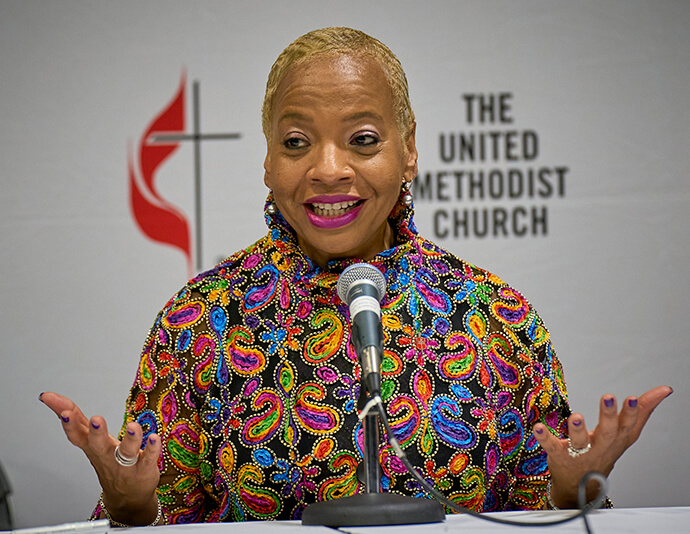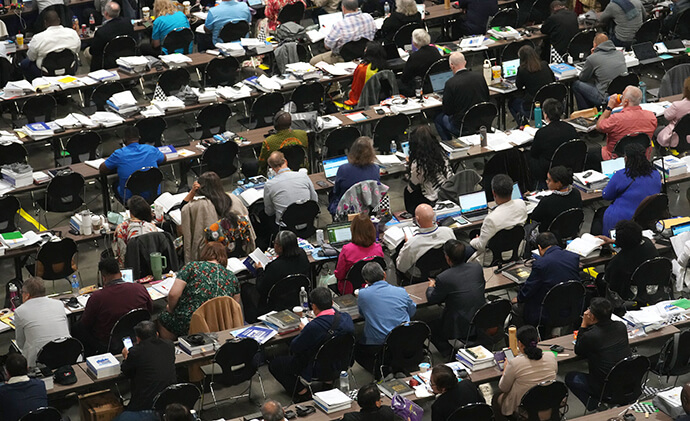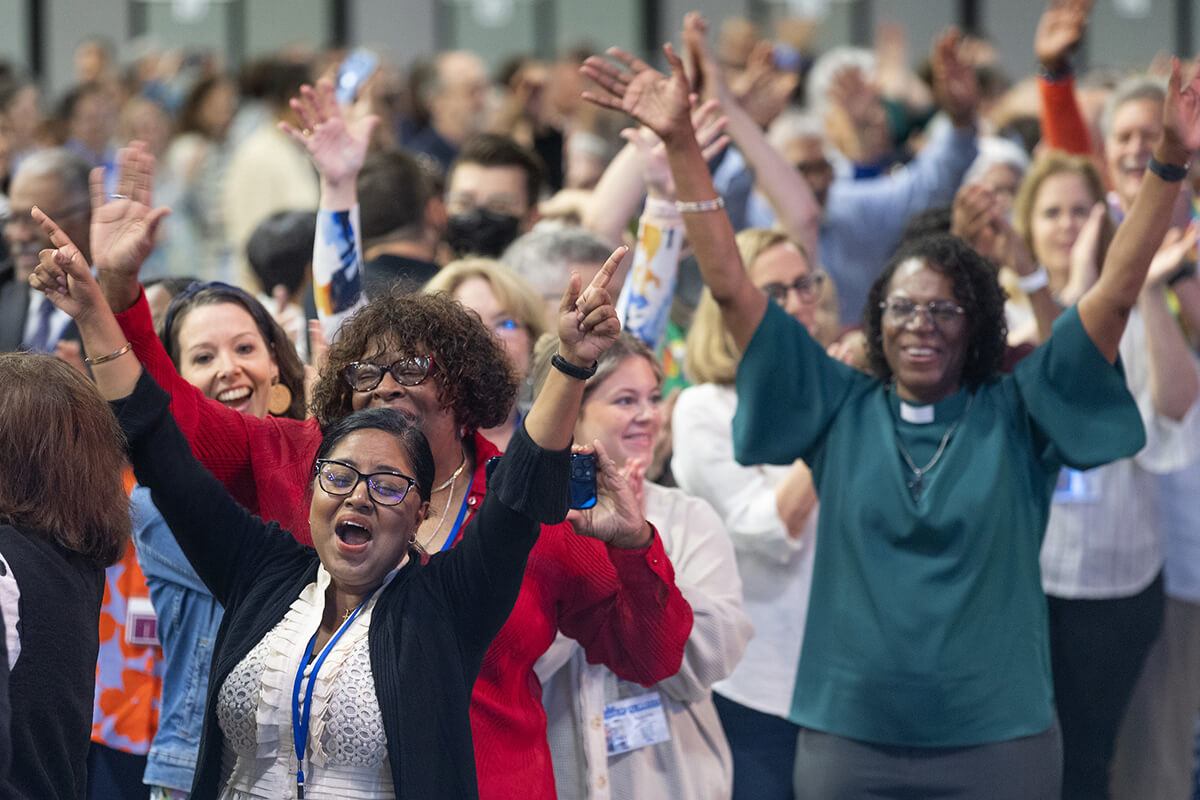Key Points:
- General Conference brought big changes, particularly the removal of constraints on ministry with and by LGBTQ people.
- Now The United Methodist Church’s challenge is to remain a big-tent denomination that can evangelize in diverse communities and countries.
- United Methodists already are preparing to move beyond denominational infighting and reach people long disconnected from church.
For the first time in its 240-year history, the denomination now known as The United Methodist Church has no category of people it officially excludes from some part of its ministry.
That is how historian Ashley Boggan D. describes the impact of the recently completed General Conference in Charlotte, North Carolina.
“This is finally our chance to be the PEOPLE called Methodist,” the top executive of the United Methodist Commission on Archives and History said by email. “And that means ALL of us have the same opportunities for mission and ministries at any and all levels of the church.”
After more than a half century of debate and defiance over the place of LGBTQ people in the denomination, General Conference delegates — by sizable majorities — voted to end decades-old bans on the ordination of “self-avowed practicing” gay clergy and the officiation of same-sex weddings.
The more than 700 delegates from four continents also adopted a whole new slate of Social Principles. The overhaul represents a culmination of an international, 12-year process to make the denomination’s teachings on contemporary social issues more globally relevant, theologically grounded and succinct. Among other things, the revised Social Principles remove a 52-year-old assertion that “the practice of homosexuality… is incompatible with Christian teaching” and broaden the description of marriage as a sacred, lifelong covenant between an “adult man and adult woman of consenting age or two adult persons of consenting age.”
In what could be the most far-reaching change for United Methodist governance, the delegates also passed amendments to the church’s constitution that would restructure the denomination. To come to fruition, the amendments need to be ratified by at least two-thirds of the total voters at the denomination’s 133 annual conferences around the world.
Under the regionalization amendments, the denomination’s presence in the U.S. and eight central conferences in Africa, Europe and the Philippines would each become regional conferences with equal authority to set many ministry policies for their missional contexts. That includes setting their own standards for clergy ordination and church marriage rites, so long as those standards are in line with local laws and the denomination’s doctrinal statements.
In short, General Conference has moved forward all of what many labeled “the three R’s” — regionalization, revised Social Principles and the removal of exclusionary language against LGBTQ people in the denomination’s Book of Discipline. While regionalization will take effect only if ratified over the next 18 months, the revised Social Principles take effect in January and the lifting of the clergy and wedding bans is already in effect.

“This has been truly a historic conference,” said Council of Bishops President Tracy S. Malone at a press conference immediately following the assembly’s conclusion. Malone, who also leads the East Ohio Conference, is making history herself as the first Black woman elected as the council’s president.
Malone celebrated the elimination of prohibitive language that marginalizes LGBTQ people. Still, she acknowledged that the actions by the denomination’s top legislative assembly have already engendered a mixed reaction among United Methodists.
Many United Methodists delight in the changes as fulfilling Jesus’ call to treat people as they would want to be treated. At the same time, many church members denounce the changes as a rejection of biblical strictures against same-sex relations. Still others wonder what all these changes will mean for the denomination’s future.
United Methodists long have held differing biblical interpretations when it comes to homosexuality and operated in a variety of legal and cultural contexts. Malone sees regionalization — along with protections of conscience that this General Conference adopted — as a way for the denomination to live into its diversity while maintaining unity.
“I think what is important that we all hear is that as The United Methodist Church, we are very diverse. And although we don’t ‘all think alike,’ the promise and the principle that we stand on is that ‘we love alike,’” Malone said, quoting one of Methodism founder John Wesley’s most famous sermons.
“The United Methodist Church is a church for all persons regardless of where one is on the theological spectrum,” she added.
Broadening ministry
In previous groundbreaking sessions, the Methodist Church’s General Conference voted to ordain women with full clergy rights in 1956 and officially ended the segregation of Black clergy and members during the same 1968 Uniting Conference that saw the union of Methodists and Evangelical United Brethren into today’s United Methodist Church.
But the 2024 General Conference — postponed from 2020 by the COVID pandemic — may be the most productive yet for the denomination’s top policymaking assembly, Boggan said.
This year’s session also saw delegates pass amendments to the denomination’s constitution intended to welcome people into church membership regardless of “gender” or “ability” and to strengthen the denomination’s stance against racism and colonialism. These amendments, too, will need to be ratified by annual conference voters to take effect.
Many see this assembly as the dawn of a new day for the denomination after decades of infighting. The upbeat gathering — where many changes passed without debate on the floor — certainly marks a stark contrast from the tumultuous 2019 special General Conference. That session saw the denomination tighten its LGBTQ restrictions and made a way for multiple churches to exit.
Poonam Patodia, chief marketing officer for United Methodist Communications, said the changes will help congregations, whatever their perspective, live more fully into the popular tagline — long used in United Methodist branding — of "Open Hearts, Open Minds, Open Doors."
"Every local church that wishes to be fully inclusive and affirming can do so now," she said. "Every pastor who wishes to officiate at a same-gender wedding can do so now –– there is no longer a line that couldn’t be crossed to live into that mission. It’s a step forward, but in some ways not so, as we have basically adopted where we were pre-1972. We also recognize that our congregants and churches vary vastly on the theological spectrum."
However, just opening church doors wider doesn’t mean more people will automatically come in.
Discipleship Ministries, the United Methodist agency that provides resources on evangelism and new church development, is expanding its offerings to help congregations reach people where they are. That includes helping United Methodists to start Fresh Expressions — Christian communities developed outside conventional church walls.
“Many of those who have been involved in the Fresh Expressions UM movement feel like General Conference validated the work they’ve been up to,” said the Rev. Michael Adam Beck, who leads Fresh Expressions UM through Discipleship Ministries.
“In essence, decisions at General Conference helped the denomination catch up to what the Holy Spirit has been doing out in the fields with United Methodists for some time.”
Many see the potential for church members to embrace an additional set of three R’s: reclaiming, renewing and reviving The United Methodist Church to reach new people with the love of Christ.
“For so long we’ve either ‘othered’ or barred either Black persons, women or LGBTQ+ persons,” Boggan said. “The challenge we have is: Can we take the inclusion that now exists on paper and implement it in the world?”

‘Bittersweet moment’
Helen Ryde, a delegate from the Western North Carolina Conference, has been thinking about that question for a long time.
Ryde — who uses they/them pronouns — is a United Methodist home missioner and an organizer with Reconciling Ministries Network, which has long advocated for full inclusion of LGBTQ people in church life.
“It was a huge relief that we were able to achieve all that we set out to achieve at General Conference,” they said. “We weren’t at all sure that would happen when we arrived.”
Yet even amid the celebration, Ryde also mourns that the changes took so long.
“It’s a bittersweet moment because there is the sweetness that all of that language is now finally gone,” they said. “There’s also the sadness for all those who are no longer here, who left for all kinds of reasons.”
Ryde specifically mentioned openly gay clergy who are now sharing their gifts with other denominations because they could not serve in The United Methodist Church.
However, Ryde also is dealing directly with the aftermath of other departures that happened before this General Conference. Ryde is part of an emerging United Methodist faith community just beginning in Haywood County, North Carolina — started by people who wanted to stay United Methodist after their church disaffiliated.
More than 7,600 U.S. churches — a quarter of the denomination’s U.S. churches — have left The United Methodist Church under a disaffiliation policy passed by the 2019 special General Conference. That provision allowed U.S. congregations to leave with property, “for reasons of conscience” related to homosexuality, if they met certain financial and procedural obligations.
From the beginning, most of the congregations that withdrew were theologically conservative and supported the LGBTQ-related bans. Departures accelerated with the 2022 launch of the Global Methodist Church, a theologically conservative denomination that has recruited mostly from the United Methodist fold.
The disaffiliation policy expired at the end of last year, and General Conference delegates voted to delete it. Annual conferences still have other ways to work with churches that want to leave, but the hope is that the vast majority of congregations will want to remain.
In fact, this General Conference passed legislation requiring annual conferences to develop church reaffiliation policies. Ryde was one of the delegates who spoke in favor of the legislation.
Ryde also wants to help the Haywood County emerging faith community reach new people who long have felt disconnected from church. The faith community, launched in December, already has seen some success in that regard, but Ryde sees more potential.
“One of the things I’m curious about, now that we’ve removed the harmful language, is how can we more comprehensively bear witness to being church in an inclusive way in our communities?”
Concerns about marriage
Both before and during General Conference, the Reconciling Ministries Network and like-minded delegates advocated for getting the Book of Discipline “to neutral”— so that it neither affirmed nor condemned LGBTQ people.
General Conference delegates also approved a measure that explicitly allows current central conferences to set their own standards for marriage and clergy ordination. If regionalization is ratified, regional conferences would have the same leeway.
More General Conference actions
United Methodist Communications staff members have compiled an overview of some of the major legislative actions taken by the recently completed General Conference.
Read legislative recap.
See all of UM News’ General Conference coverage.
However, a number of United Methodists worry that this year’s General Conference went too far in reversing course. That’s especially true for United Methodists who live in countries where laws and/or culture strictly forbid same-sex relations.
“The danger is the excitement and celebration that took place without considering that it would hurt others, and I am concerned that our actions could have literally donated Africa to other sects and religions,” said Shepherd Mpemba, a delegate from the West Zimbabwe Conference. He is also a newly elected member of the commission that plans General Conference.
“I still believe sin is sin and cannot be wished away,” he added.
For Mpemba and others, a particular sticking point was how General Conference broadened the church’s position on marriage in the Social Principles. Unlike many matters of church administration, the Social Principles themselves are not adaptable by either central conferences or the proposed regional conferences.
After the vote on the Social Principles, about 65 African delegates and Bishop John Wesley Yohanna of Nigeria joined in a protest against the expansive language.
Notably, Molly Hlekani Mwayera — a delegate from the East Zimbabwe Conference — made the proposal from the floor that General Conference adopted to recognize marriage by both a man and a woman and by two adults. As submitted, the legislation originally only mentioned "two people of faith."
She told delegates the “double-barreled” description would make the church’s position on marriage in line with nations’ laws both where same-sex marriage is permitted and where it is prohibited.
Zimbabwe Bishop Eben K. Nhiwatiwa and all three bishops in the Philippines have released statements reiterating their commitment to The United Methodist Church and that their areas would only solemnize marriage between a man and a woman.
“We are not in favor of same-sex marriage, and we do respect the LGBTQ community, but we are not in favor of ordaining practicing, self-avowed homosexuals,” said the statement by Filipino Bishops Rodel M. Acdal, Ruby-Nell M. Estrella and Israel M. Painit. “We will continue to be traditional in spirit and principle and protect the interest and welfare of the United Methodist Church in the Philippines.”
Similarly, Nhiwatiwa’s statement said the church in Zimbabwe would maintain its current stance against homosexuality. He also credited delegate and Zimbabwe Supreme Court Justice Hlekani Mwayera for ensuring the Zimbabwean position is upheld. She is also a newly elected member of the Judicial Council, the denomination’s top court.
“The future of The United Methodist Church in Africa and in Zimbabwe in particular is bright,” he said. “We want to develop and continue a United Methodist type of brand in Zimbabwe.”
Staying a big tent
The Rev. John Stephens, a delegate from the Texas Conference and senior pastor of the theologically diverse megachurch Chapelwood United Methodist Church in Houston, is dealing with lots of questions.
“One of the big things I want our church to know is this: The UMC didn’t change the definition of marriage; The UMC changed who is allowed to be married in the church,” he said.
He pointed out that the Social Principles are not doctrine — a distinction reserved for United Methodist belief in such timeless truths as Christ’s resurrection and the Triune God. Instead, the revised Social Principles speak to contemporary concerns, and Stephens said that means recognizing how marriages exist in the world.
Subscribe to our
e-newsletter
Stephens, who describes himself as a “a self-defined conservative,” also sees the protections added by this General Conference as enough to ensure the denomination can remain a big table.
General Conference passed explicit protections to ensure clergy would not be compelled to officiate at any wedding, same-sex or otherwise. On General Conference’s final day, the Judicial Council held that church boards of trustees could still set policies banning same-sex wedding services within their walls.
“You can be United Methodist and be traditional, believing marriage was instituted by God between a man and a woman,” Stephens said. “You can be a United Methodist and be progressive, believing marriage may include those of the same sex. Unity of the Body of Christ does not require uniformity, but it does require love.”
The Rev. Sandra Bonnete-Kim, the pastor of Carter Memorial United Methodist Church in Needham, Massachusetts, said this year’s assembly was unlike any of the other three General Conferences she attended before.
“People are more collaborative, respectful, and wanted to create a new United Methodist Church,” said Kim, who is also president of the National Association of Korean Clergy Women. “Many were already living into regionalization, recognizing and acknowledging that we all live in different cultures and with different theologies.”
She said she still feels the church has work to do in addressing racism. As a Korean American, she said she has witnessed how Koreans are often made invisible in denomination-wide discussions.
“To me, this is the next area we must work on to truly create a welcoming United Methodist Church where everyone has a place.”
For her part, Boggan — the historian and head of Archives and History — plans to immediately begin collecting, preserving and telling stories of LGBTQ United Methodists. She regrets that it took the denomination 36 years to intentionally collect and preserve the stories of Black United Methodists who experienced the segregated Central Jurisdiction.
“We’ve now lived up to the standard of inclusion that both Jesus Christ and John Wesley set (in different but comparable ways) and now we get the opportunity to work together, build relationships and rebuild connection,” Boggan said.
“We can open our doors and proclaim the good news,” she added. “But unless we actually step out of those doors and take the good news to people, all we’re going to end up with is well-ventilated sanctuaries.”
Hahn is assistant news editor for UM News. Contact her at (615) 742-5470 or newsdesk@umnews.org. The Rev. Thomas E. Kim and Jim Patterson contributed to this story. To read more United Methodist news, subscribe to the free daily or weekly Digests.



